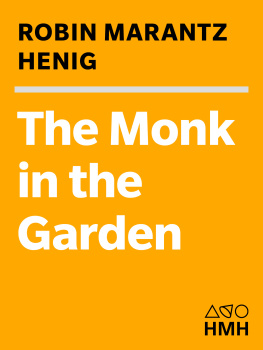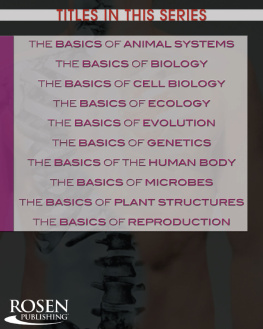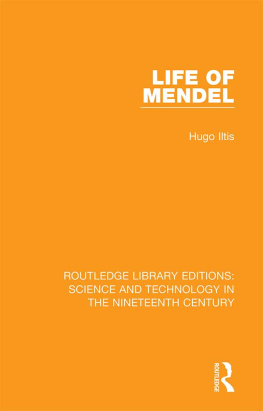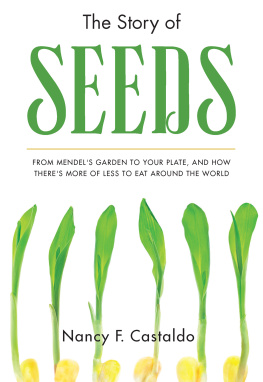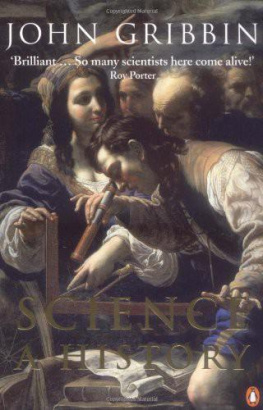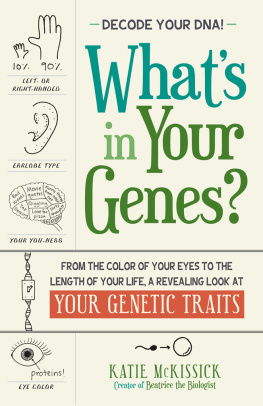First Mariner Books edition 2001
Copyright 2000 by Robin Marantz Henig
ALL RIGHTS RESERVED
For information about permission to reproduce selections from this book, write to or to Permissions, Houghton Mifflin Harcourt Publishing Company, 3 Park Avenue, 19th Floor, New York, New York 10016.
www.hmhco.com.
The Library of Congress has cataloged the print edition as follows:
Henig, Robin Marantz.
The monk in the garden : the lost and found genius of Gregor Mendel, the father of genetics / Robin Marantz Henig.
p. cm.
Includes index.
ISBN 0-395-97765-7
ISBN 0-618-12741-0 (pbk.)
1. Mendel, Gregor, 18221884. 2. GeneticistsAustriaBiography. I. Title.
QH 31. M 45 H 464 2000
576.5'092dc21 [ B ] 00-024341
e ISBN 978-1-328-86825-1
v2.0717
The plan of the St. Thomas monastery on , from The Theory of the Gene by Thomas Hunt Morgan (1926), is reprinted by permission of Yale University Press.
In memory of my father, Sidney Marantz
I often think of him now as one of a dying breed of men, who want, really, nothing for themselves, who have effaced their innermost desires without self-flagellation, andin order to avoid the desperations of solitudehave given themselves over completely to their wives and to their children, and ultimately to their childrens children, and done it with a magnificent serenity.
The Flower Garden, David Guterson
Prologue: Spring 1900
There is a kind of immortality in every garden.
Stillmeadow Daybook, Gladys Taber, 18991980
T HE BLUE LOCOMOTIVE of the Great Eastern Railway streaked through the Cambridgeshire countryside. To a farmer nearby, the trains cars were a rumble of teak and steel plowing through his fields, where seedlings of barley, wheat, and oats etched their own green tracks in the springtime loam. It was May 8, 1900, and the earth, like the new century itself, pulsed with possibilities.
Among the trains passengers was William Bateson, a large, stoop-shouldered man, a don at St. Johns College, Cambridge. His tweed vest strained at the buttons, his handlebar mustache gleamed; only his droopy eyes saved him from looking self-satisfied or smug. Bateson, a zoologist, had just turned forty and was one of Britains chief combatants in the controversy over evolution and the theory of natural selection, still a source of strident debate more than forty years after Charles Darwin first proposed it.
When he boarded the train, he could have had no idea that in the next sixty minutes he would read a paper that would change the course not only of his own career but of our understanding of the place of mankind in the great cacophony of nature.
Beyond the windows of the velvet and leather compartment Bateson could see mazes of hedgerows to the left, a pretty little river to the right. A tan stucco pub, looming beyond a hillock just past Harlowtown, marked roughly the halfway point on the familiar trip from Cambridge to London. But according to the legend that has persisted for a full century, Bateson spent most of that train ride immersed in an old article from a small journal published in Austria. He was not gazing idly at the scenery.
The article, written by an obscure monk named Gregor Mendel, described the elegant botanical experiments he had conducted in a modest monastery garden in Moravia. Mendel had painstakingly crossed and backcrossed pollen and egg cells from the common pea plant to reach a better understanding of inheritance. After working on peas and other plant species for seven long years, Mendel had recorded and analyzed his findings in a two-part lecture to a local scientific society in 1865. The lecture was later published as a forty-four-page article in the societys Proceedingsand then was all but ignored for the rest of Mendels life.
What had brought Bateson to that article on that morning in May of 1900 was the work of three other scientists, one of whom was the subject of his lecture that very afternoon. All three had cited Mendels forgotten paper almost simultaneously in separate publications. Uncannily, like a field of oat stalks that somehow know to erupt in unison, the three articles had appeared within two months of one another, during that same spring.
As he read, Bateson realized that what he was trying to do in his own experiments was almost precisely what Mendel had already done thirty-five years before. He was both shocked and elated. As his wife put it, using a metaphor that prettily evoked Mendels garden, it was as though, with a very long line to hoe, one suddenly finds a great part of it already done by someone else. One is unexpectedly free to get on with other jobs.
By the time the Great Eastern Railway train pulled into Liverpool Street Station, Bateson knew he would have to rewrite the lecture he was about to deliver to the Royal Horticultural Society on problems of heredity as a subject for horticultural investigation. He had planned to focus on the work of Hugo De Vries, the great Dutch botanist whose new mutation theory might account for the large-scale variations that Bateson believed were necessary to propel Darwins natural selection, the underlying mechanism of evolution. But now, as he pushed through the crowd in search of a carriage to the curving street known as Buckingham Gate, Bateson was suddenly more interested in describing the work of this unknown monk, whose findings resonated so beautifully across the thirty-five years and eight hundred miles separating London from the hilly recesses of southern Moravia.
Settling into a carriage, absentmindedly fingering his vest to be sure it was still buttonedhis wife accused him of being so indifferent to his attire that he would wear gardening clothes to town and town clothes in the gardenBateson began to mull over his opening lines. How should he introduce this forgotten genius to the English-speaking world?
In a drafty space in Drill Hall, Bateson gave a lecture that demarcated a turning point in his evolution as a scientist. An exact determination of the laws of heredity will probably work more change in mans outlook on the world, and in his power over nature, than any other advance in natural knowledge that can be foreseen, he began. There is no doubt whatever that these laws can be determined.
Bateson spoke for more than an hour. Whatever his exact words that afternoonall we have now is a text printed two years later, no doubt edited and amended to include more references to Mendelwe can surmise, based on a report published that week in the RHSs official journal, Gardeners Chronicle, that there was not much discussion. But the die was cast: William Bateson had aligned himself irrevocably with the legacy of Gregor Mendel.
Within a few years, Bateson understood the sweep of Mendels contribution. He made a pilgrimage to Brnn, the town where Mendel had lived and worked; had the monks paper translated into English; coined the word genetics; and became the chief apostle of a new scientific discipline that represented the very apotheosis of the twentieth century. He became embroiled in a scientific controversy that pitted him against some of the greatest biologists of his day, including one who had been his best friend when they were both undergraduates at Cambridge. Indeed, the controversy would become so bitter and so personal that, when this former best friend died unexpectedly in 1906, some accused Bateson of killing him.
So much about gardening feels like a metaphor. Take weeding. The ubiquity of the weeds, their thorny tenacity, the hardiness of their buried roots, all seem to symbolize the pitfalls of life itself, the temptation to settle for the superficial fix even though we know that deep-seated problems will return later, or elsewhere, in other, hardier forms. It makes sense, then, to look to the garden for metaphors regarding who we are, who our ancestors were, and where we and our descendants are headed.
Next page
